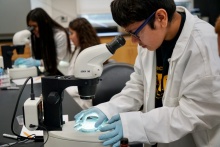- Build sustainable and egalitarian relationships with community partners
- Provide accessible and high-quality psychological services to underinsured and underserved communities
- Advocate for the mental health needs and dignity of rural Iowans
- Train students in culturally competent telepsychology service delivery
- Engage measurement-base care and ongoing internal monitoring and improvement
Telepsychology Training Clinic
The University of Iowa’s Telepsychology Training Clinic (TPTC) offers free, short-term (5-10 sessions) counseling to Iowans who may have limited access to mental health care. Referrals to community resources can be provided if long-term care is indicated.
The TPTC is currently accepting new client referrals. Please contact scheduling@uitptc.com or call 319-535-0437 and leave a voicemail to inquire about services. This email and phone are intended for scheduling purposes only and are not monitored at all times. If you are experiencing an emergency, please call 988, 911, or go to an emergency room immediately
How do I qualify?
- Currently live in Iowa
- Not already seeing a counselor
- Have access to internet
- Own a device with a camera and microphone
Clinical Services
The TPTC provides individual and group counseling and mental health services, career services, and psychoeducation workshops and programs.
Clients meet with a TPTC counselor using a secure videoconferencing program (internet or cellular service required) to address concerns like coping with experiences of depression and anxiety, processing grief and loss, navigating conflict and other relationship concerns, and finding support around experiences of discrimination and trauma. Short-term counseling means that most people meet with a counselor between 5-10 times to focus on specific concerns, rather than engaging in open-ended and on-going counseling. TPTC counselors can also assist with getting connected to a longer-term counselor in the community when desired and if short-term counseling may not be a good fit.
Training Opportunities
The TPTC provides training opportunities in research and clinical practice.
Future psychologists will be trained through the program to provide culturally competent care for the complex mental and behavioral health needs of Iowa and the nation’s underserved rural populations, including their veteran and Latino subpopulations. Stipends will be provided to CP Ph.D. students in interdisciplinary practicum experiences in rural settings with allied professionals.
Training will focus on integrated care among health services providers. The foundation for this training project is in the following outstanding programs at the UI: the Ph.D. CP Program, the UI Mobile Clinic), UI Department of Psychiatry, UI College of Public Health, and the VA Hospital in Iowa City. Faculty and staff affiliated with each of the units will provide rigorous teaching and research training to HRSA-supported Ph.D. students to enhance the nation’s capacity for teaching and research in behavioral health interventions, specifically targeting rural populations.
Training topics will include Latino immigration trends, cultural health behaviors, health psychology, and challenges to effective service provision and so forth. Through the development of curriculum enhancements, academic support mechanisms, and new and enhanced practicum experiences we will enable students to: 1) provide comprehensive behavioral health service to rural residents; 2) learn comprehensive care strategies for treating underserved populations; and 3) be competitive for pursuing job opportunities in rural areas.
Partnerships
The University of Iowa Mobile Clinic is an interdisciplinary student organization founded in 2002, that provides free health screening, prevention, education, and basic health services to under-served populations.
Student Health and Wellness (SHAW) at Grinnell College offers an integrated model of physical health and mental health services to support the personal and academic success of all Grinnell College students. The TPTC is partnering with SHAW to provide counseling to Grinnell College faculty and staff.
The UIHC Department of Addiction Medicine is dedicated to offering care and hope to all people with addiction issues, and providing resources to the general university community, and state of Iowa. Their integrated, multi-disciplinary team of professionals work together to provide flexible and complete care for patients with addiction issues and/or mental health issues.
The University of Iowa Mobile Clinic is an interdisciplinary student organization founded in 2002, that provides free health screening, prevention, education, and basic health services to under-served populations. They believe healthcare is a basic human right to which all people should have equal access. The Mobile Clinic builds partnerships, such as the TPTC, to encourage individuals the opportunity to improve their well-being.
The Free Mental Health Clinic Iowa City has a mission to provide transitional mental health care to the bridge the gap for uninsured or underinsured in the state of Iowa as they attempt to find a mental health home. They aim to provide compassionate, prompt psychiatric treatment for those in need. Providers include medical, pharmacy, and social work students led by physicians and other healthcare workers.
The Robert Young Center for Community Mental Health, an affiliate of UnityPoint Health – Trinity, is a comprehensive community mental health center specializing in mental health, substance abuse and crisis services for children, adolescents and adults in the Quad Cities and Muscatine-area.
Who We Are
The Rural Psychology Collaborative and TPTC are staffed by Counseling Psychology doctoral trainees, postdoctoral scholars, and faculty.
Core Values
- We are committed to community engaged research and practice
- We believe healthcare is a basic human right to which all people should have equal access
- We believe in the importance of learning with community partners through needs assessments and building meaningful and sustainable relationships
- We value diversity and work to increase justice and equity for all individuals and communities
- We believe in holding ourselves to the highest standards of honesty, fairness, and professional ethics and will evaluate our activities and our partnerships based on these same values
Meet Our Supervisors
Saba Rasheed Ali

Professor, Counseling Psychology
Training Background: PhD in Counseling Psychology, University of Oregon, 2001
Clinical interest: Employment and mental health issues among rural populations, in particular I am interested in how gainful employment (decent work) and mental health are related for those living in rural areas. I am also interested in issues of economic justice and how we can partner with communities to provide more employment opportunities.
Multicultural Interests: My interests include immigrants living in rural areas and community based approaches including working collaboratively to find creative solutions to community mental health issues. I believe that a university has a commitment to larger community and that we have a lot to learn from our community partners.
Dennis (Martin) Kivlighan

Professor, Counseling Psychology
Training Background: PhD in Counseling Psychology, University of Wisconsin - Madison, 2015
Clinical interests: My clinical interests include individual and group psychotherapy and psychotherapy training and supervision. As a therapist, I work from an interpersonal dynamic approach to help clients strengthen and maintain the relationships in their lives. I strive to create strong, trusting, and genuine relationships with my clients and provide support and challenge within the therapeutic relationship to help clients realize their treatment goals and live more fulfilling lives.
Multicultural interests: As a therapist, I ascribe to the Multicultural Orientation (MCO) Framework to attend to clients’ salient cultural identities and experiences within the therapeutic relationship.
Charles Bermingham

Clinical Professor, Counseling Psychology
Training Background: PhD in Counseling Psychology, University of Iowa, 2016
Clinical Interest: I believe that therapy is a wonderful space to explore oneself and receive support around any number of stressors, and that space for healing and self-growth should absolutely be available to everyone regardless of location or financial means.
Multicultural interest: Unique mental health needs in rural communities
Meet Our Counselors and Staff
Jennie Spencer
Jennie is a third-year doctoral student in the Counseling Psychology Ph.D. program at the University of Iowa and is one of the clinic coordinators at the TPTC. This is Jennie's second year training at the TPTC. As a clinician, Jennie tries to create a safe relationship where it is possible to listen together to any aspect of your experience without judgment. Jennie is most influenced by psychodynamic and existential-humanistic approaches to therapy and believes high-quality, culturally-sensitive psychotherapy should be accessible to everyone.
Lyuchen Ben (she/they)
I am a doctoral candidate in Counseling Psychology at the University of Iowa. I am a clinical coordinator at the TPTC. I practice Narrative Therapy, which emphasizes storytelling. Sometimes, people tell themselves a single story, which prevents them from seeing other possibilities. I help people create more storylines in their lives. In this way, we can see more possibilities.
Matthew McMurray
Matthew is a doctoral candidate in the Counseling Psychology Ph.D. program at the University of Iowa. Matthew is one of the TPTC clinic coordinators. He practices psychotherapy primarily from a person-centered therapy (PCT) lens, striving to empower clients in their self-determined growth by helping them explore themselves and their experiences with a spirit of empathy. Matthew strives to offer meaningful understanding and genuine appreciation, acceptance, empathy, and respect to every person.
Iris Peimann
Iris is a second-year doctoral student and trainee in the Counseling Psychology Ph.D. program at the University of Iowa. Iris’s counseling interests include a wide range of concerns but her primary goal is to create a space in which you feel heard, respected, and cared for. She primarily approaches work in the clinic through an Acceptance and Commitment Therapy lens but is open to exploring and integrating other approaches to fit each client’s unique needs. She believes each client already holds within them the ability to make positive change and acknowledges the vulnerability and strength it takes to begin therapy. She is here to work alongside you as you make meaning of your life experiences and find ways to create positive and lasting change.
Yinmayue (Zoe) Tang
Yinyue (Zoe) is a second-year doctoral student and trainee in the Counseling Psychology Ph.D. program at the University of Iowa. Her clinical interests include depression, anxiety, adjustment difficulties, interpersonal issues, obsessive-compulsive thoughts and behaviors. Yinyue focuses primarily on Acceptance and Commitment Therapy (ACT), while also integrating CBT (Cognitive Behavioral Therapy) and other approaches that best align with each individual’s goals. Yinyue aims to create a safe, non-judgmental space for each individual, collaborate with clients in deep exploration of their inner world, and support them in developing the skills needed to live a more fulfilling and satisfied life in the real world.
Gihun Im
Gihun is a second-year doctoral student in the Counseling Psychology Ph.D. program at the University of Iowa and the community engagement and partnership coordinator at the TPTC. Before moving to the U.S., he worked at the headquarters of the Seoul Metropolitan Office of Education, where he helped coordinate the citywide school counseling system. In his current role, Gihun builds partnerships with campus and community organizations, strengthens referral networks, and supports broader access to mental health resources.
Project HOPE
Project HOPE (Healthcare Occupations Preparation and Exploration) is a STEM-based curricular intervention that integrates academic and vocational opportunities designed to connect minority and low socioeconomic middle school students to the health science professions early in their education. HOPE addresses the critical national need to increase diversity in the American healthcare workforce.

Associated Grants
Behavioral Health Workforce Education and Training (HRSA)
The Iowa Health Resources and Services Administration (HRSA) Behavioral Health Workforce Education and Training (BHWET) program is intended to train future psychologists to treat the complex mental and behavioral health needs of Iowa and the nation’s rural populations. The Integrating Behavioral Health into Rural Medicine project supplements and complements ongoing Counseling Psychology training efforts and provides new field experiences and practicum opportunities for CP doctoral students to provide mental and behavioral health care to underserved populations living in rural areas.
Graduate Psychology Education
The Iowa Health Resources and Services Administration (HRSA) Graduate Psychology Education (GPE) program is intended to train future psychologists in the Counseling Psychology (CP) program to develop and implement a sustainable training program in telepsychology for opioid use disorder (OUD) and substance use disorder (SUD) prevention and treatment in rural Iowa.

